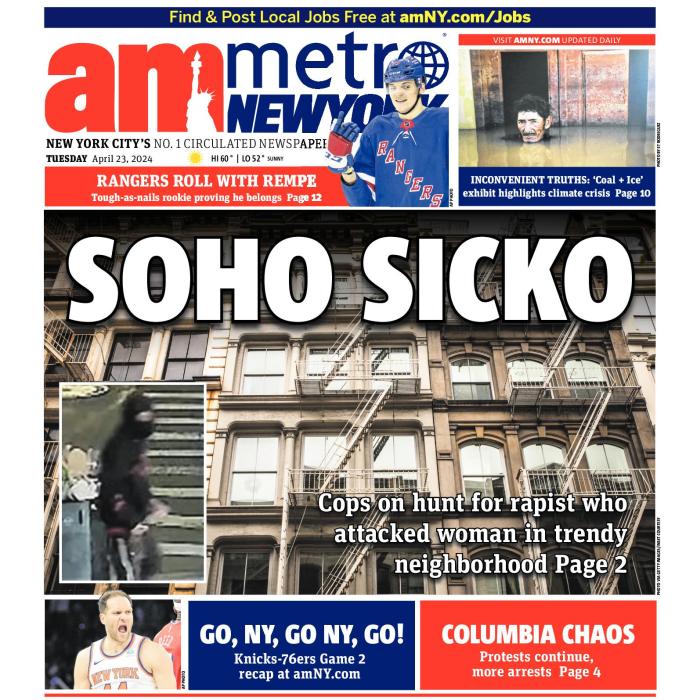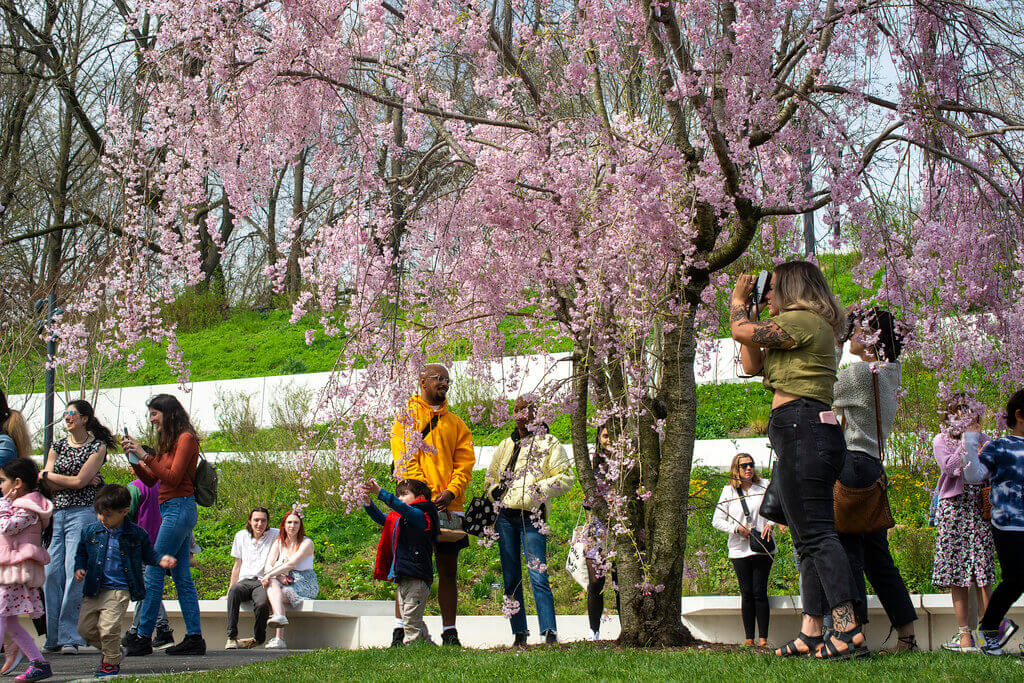BY WINNIE McCROY | Concerned Chelsea residents continue to take issue with Jamestown Properties’ intention to build a hotel and office space atop the Chelsea Market. In addition to issues of overdevelopment and a lack of need for additional office and hotel space, members of Save Chelsea and other neighborhood groups maintain that Jamestown’s plans for the project include a quick turnover of the property.
Those suspicious were strongly refuted by Jamestown Managing Director Michael Phillips — in a September 20 phone conversation with Chelsea Now. “We have just put a long-term seven year mortgage on the asset. We have no intention at all of selling. If you were having this argument a year, ago I would buy all of that. But now concrete things have happened that have made that a huge improbability.” He went on to add that the tax burden alone associated with flipping should effectively nullify speculation that they intend to part with the property.
“We could not sell the asset without paying tens of millions of dollars in penalties,” observed Phillips — who again articulated the Jamestown position: “We are 100 percent committed to owning this asset for the next seven to ten years.” In addition, he notes, “We have extended and renewed tenants who are in place in the Market. Bowery Kitchen has a new lease… We are very committed to the ground floor of the Market. I think it’s more dynamic than it’s ever been.”
In an August 2 letter to Speaker Christine Quinn and other elected officials and city employees, Save Chelsea co-presidents Lesley Doyel and Justin Hoy addressed their concerns with Jamestown Properties’ efforts to secure a zoning variance. This variance to the Special West Chelsea Zoning District is necessary before Jamestown begins construction. In return, Jamestown must contribute $17 million toward the upkeep of the High Line Park.
“Save Chelsea not only opposes the proposed number of stories, but, in principle, opposes the addition of any height and bulk to the historic complex, which will surely result in increased traffic, create limited views of the sky and cast shadows onto the surrounding streets and nearby High Line Park,” the letter reads.
The letter notes that although Jamestown representative Ben Gainey said during a July 26 meeting that he intended to retain Chelsea Market “for the rest of his life,” keeping the Market’s existing tenants, Jamestown’s published statements appeared to differ.
After translating the parent company’s website from German to English, Save Chelsea members said the site states that the company now has majority ownership of the building, and fully intends to raise rents and buy out contracts to position the Chelsea Market for later sale.
“The increased debt service costs will be more than compensated for by the steps to increase rental income. The investments will lead to a clear increase in value of Chelsea Market, so that the object will be very well positioned for a later sale,” their translation reads, according to Save Chelsea’s letter to Quinn.
The letter closes by reiterating Jamestown’s track record of purchasing notable commercial properties (including the General Motors Buildings and 1290 Avenue of the Americas) solely for the short-term maximization of return for its investors, selling the property in an average of five years.
But in his September 20 conversation with Chelsea Now, Phillips — who, while not privy to the English translation of the German content Save Chelsea refers to — maintained that the accusations and speculation are based on text lifted from an investor letter that’s applicable to neither the current situation nor future plans. ” We bought those investors out,” Phillips says, “and now we own 100 percent of the asset. That capital event happened in spring of this year.”
As for the future of the Market itself, Phillips says, “The culture of Chelsea Market is very much in tact. Having a dynamic ground floor is an essential component to renting office space. It’s essential to our business identity. We love the Chelsea Market. We would never do anything to damage that. That’s not our goal.”
Community wants commitment from Jamestown
While Jamestown Properties is well within their rights to build on (and even sell) its existing property, Chelsea residents have begun to demand a commitment from the company that owns this historic New York landmark.
Some take issue with a recent move by Jamestown to hire residents of nearby Fulton Houses at $17 an hour to solicit neighbors to sign a petition supporting the expansion.
“They have every right to circulate their own petition, but I had heard that the people [from Fulton Houses] were giving out misleading information,” said James Jasper, a Chelsea resident and CUNY professor. “They said that the project would provide thousands of jobs for local residents, but the truth is I don’t think it will provide any jobs for locals — certainly not those in Fulton Houses.”
Carol Demach, a resident of 17th Street, said that a woman recently came to her door asking her to sign such a petition, telling her it would create thousands of jobs for residents. Doubtful, Demach, phoned Jamestown Properties to ask them what they had ever done for the Chelsea community.
Demach said that a Jamestown rep told her about their work with Fulton Youth and mentioned Community Board 4 (CB4) member Miguel Acevedo, who runs the Fulton Youth for the Future and helps organize the Ninth Avenue Fulton Youth Greenmarket.
While recently shopping at the greenmarket, Demach said she and Acevedo got into an argument. She said she told him “that if Jamestown properties really wanted to help Fulton Youth then they would give deserving students scholarships, and that $17 is not a livable wage for a working adult.”
“I don’t know if Jamestown is playing unfairly, but I think if they are hiring people from Fulton Houses to petition, these are the only jobs they are going to get,” Jasper said. “Possibly there will be some jobs on the hotel side, but these are high-tech computer companies trying to get in there.”
Acevedo found this assumption insulting, noting that Jamestown has always been there for the residents at Fulton Houses.
“Just because the people at Fulton are not all well-educated, it’s an insult to say no one from here would be able to work in that field,” Acevedo said.
“People stereotype us because of where we live,” Acevedo continued. “They see us as an eyesore to the community, especially with the gentrification going on here. But 20 years ago, no one would build two blocks from Fulton Houses. And Jamestown is literally building on our property now.”
Acevedo pointed to multiple ways Jamestown has helped the residents of Fulton Houses, noting that they sponsor events including Family Day and a holiday turkey giveaway to 600 of Fulton’s 1,000 families. “They know that at Fulton Houses, a majority of families are low- or fixed-income, and that’s their way of working together with us.”
He also said that the Market hires about a dozen kids every summer to work shifts earning spending money for school clothes. They also provide a culinary arts scholarship, which has so far installed three Fulton Youth in the city’s top kitchens. Acevedo said he is looking for other ways for Jamestown to provide employment for the community. He will approach them about starting an IT scholarship, so that Fulton Youth can get jobs in the high-tech companies that will be housed in Chelsea Market.
Acevedo will also request that a certain percent of jobs created by the expansion will go to Fulton Houses residents. “Even if it’s 20 percent of 1,200 jobs, that’s 100 jobs we can get from it,” Acevedo said. “We have a lot of single mothers here who want to live on their own. The more money brought into Fulton Houses, the better. Instead of draining the public assistance system, you are earning your own funds.”
Acevedo also held out hopes that the rezoning of Chelsea Market would allow some of the $17 million Jamestown must contribute for upkeep of the High Line Park to go toward affordable housing, such as the project on 18th Street proposed by Artemis Housing several years ago.
“If we had $5 million of this money, there’s no reason why they shouldn’t start building this tomorrow,” Acevedo said. “But Jamestown told me that because of how the zoning laws are written, they have to give the money to the High Line.”
How many jobs will be created?
Apart from her clash with Acevedo, Demach’s main issue with the flyer being passed out by Chelsea Market was that it noted that, “The proposed Chelsea Market expansion will: create as many as 1,200 new full-time jobs.”
This statistic is noted in the video posted on chelseamarketnext.com. A Chelsea Improvement Company representative explains that the expansion project is twofold, intending to infill in the staggered edges on the north Ninth Avenue side, and “office expansion on the Tenth Avenue side, increasing the height of the building to really fit in to the neighborhood that’s developed over the last 10 years…. The Tenth Avenue side would house approximately 1,200 new jobs for office tenant growth.”
While the new office space could easily house an additional 1,200 positions, many question the assumption that these positions will be created by the expansion.
In a September 7 letter to CB4 Chair Corey Johnson, Sarah L. Rosenfield of the 300 West 15th Street Block Association writes that, “J. Ben Gainey estimates that the expansion will generate 1,200 jobs. We have no reason to quibble with that number. But he says that the expansion will ‘create new’ jobs. This seems unlikely. More likely this will simply move jobs from one neighborhood of New York to another.”
Ever the pragmatist, Acevedo shared this view, saying, “You have to give and get as a community. You can’t just oppose everything, because then you get nothing.” Citing as an example the opposition against rebuilding St. Vincent’s Hospital, Acevedo noted, “All these people were fighting against rebuilding the hospital, and now look what happened: We have no hospital. The opposition prolonged the agony, and Landmarks just ended up approving it anyway, but it was too late, because the money was spent. Who won? The Rudins, not us. And now we have no hospital.”
“You have to give and get as a community,” he continued. “You can’t just oppose everything, because then you get nothing. This will go in front of the City Council and the Planning Commission, and they will get the rezoning anyway. At least if we negotiate with them, we will get something at the end of the day.”
NOTE: This article was updated at 2:23pm on Wednesday, September 21–to reflect the fact that earlier in the day, Michael Phillips contacted Chelsea Now to clarity that Save Chelsea’s translation of text from the German website referenced a recent investor letter (not, as he previously indicated, the 2002 prospectus).

















